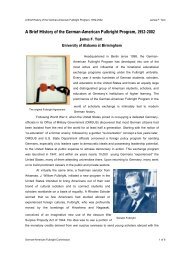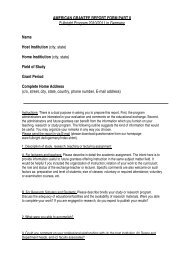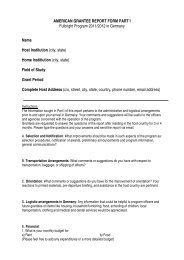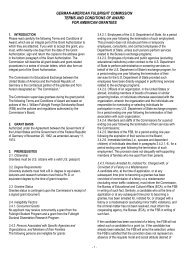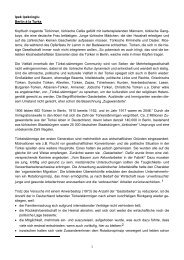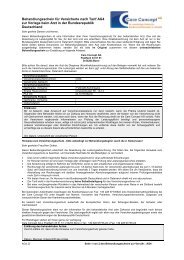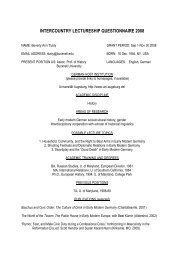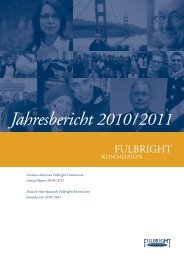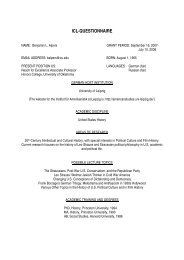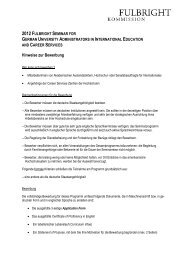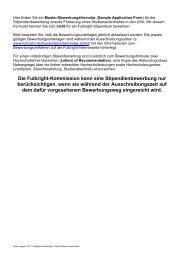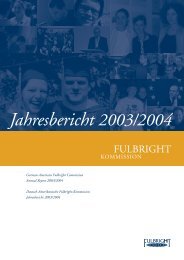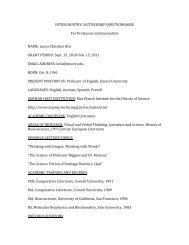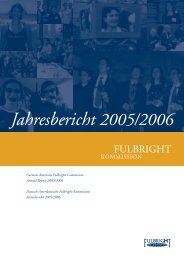The First Class of Fulbrighters - Fulbright-Kommission
The First Class of Fulbrighters - Fulbright-Kommission
The First Class of Fulbrighters - Fulbright-Kommission
You also want an ePaper? Increase the reach of your titles
YUMPU automatically turns print PDFs into web optimized ePapers that Google loves.
others had deserted the course, and the<br />
downcast speaker, unable to address me,<br />
his lone auditor with the standard<br />
“Meine Damen und Herren,” 3 came up<br />
with the designation “der einzige Treue.” 4<br />
And what a contrast it was to wrestle<br />
with the incomprehensible Bavarian<br />
dialect on the streets after basking<br />
in eloquent high German in the Aula!<br />
<strong>The</strong>n, there were the literary colloquia<br />
in the evenings with authors such as<br />
Leonard Franck reading from their<br />
latest works, not to mention the solo<br />
recitals with such living legends as<br />
Wilhelm Kempff or the concerts <strong>of</strong> the<br />
dynamic Eugen Jochem and the Bavarian<br />
State Orchestra.<br />
Literally every evening was spent<br />
at either some musical event or at the<br />
theater, with Elisabeth Schwarzkopf,<br />
for instance, singing the role <strong>of</strong> the<br />
Marschallin in Rosenkavalier at the<br />
Prinzregenten or at the Kleine<br />
Komödie, where the German premiere<br />
<strong>of</strong> Beckett’s Waiting for Godot was being<br />
performed. And we enjoyed all <strong>of</strong> this<br />
at student prices—three Marks or so for<br />
very good seats purchased at the very<br />
last minute (the exchange rate at the<br />
time being 4.20 DM to the dollar!).<br />
What treasures were housed at the<br />
Haus der Kunst or at the Alte<br />
Pinakothek. Never before or since have<br />
my days been so replete with cultural<br />
icons. Of course, there were also the<br />
less highbrow, yet unforgettable,<br />
evenings at a Schwabing Bierstube 5 or<br />
the hours spent strolling along the<br />
Isar, down Ludwigstrasse, around the<br />
Königsplatz, or through the English<br />
Garden. <strong>The</strong> atmosphere in Munich<br />
was saturated with art and culture, and<br />
I was the sponge that never ceased to<br />
soak it all up.<br />
To be sure, there were moments <strong>of</strong><br />
personal disappointment, such as the<br />
day when I was seated in a large lecture<br />
hall and a student approached me<br />
and asked: “Ist der Platz neben Ihnen<br />
frei?” I nodded and replied with a single<br />
word: “Ja,” to which he responded—much<br />
to my dismay—“Oh, Sie<br />
sind Amerikaner.” 6 My as yet unpolished<br />
German had been exposed by a<br />
single monosyllable, and over the years<br />
I have pondered exactly how this happened,<br />
but no definitive answer was<br />
forthcoming. Was the “a” in “Ja” perhaps<br />
too short or too Anglicized?<br />
John Fetzer in 1953<br />
John Fetzer’s twenty-eight-year career<br />
at UC Davis (1965-93) consisted <strong>of</strong><br />
two stints as Chairman <strong>of</strong> the Department,<br />
two visiting pr<strong>of</strong>essorships<br />
(Dartmouth in 1976, the University<br />
<strong>of</strong> Exeter, England ,1990-91), the<br />
Directorship <strong>of</strong> a Summer Institute for<br />
German Language and Culture in<br />
Santa Barbara (1987-92), as well as<br />
a plethora <strong>of</strong> graduate and undergraduate<br />
courses in German culture, literature,<br />
and music. Fetzer is also the<br />
author <strong>of</strong> two books on Clemens<br />
Brentano and two on Thomas Mann,<br />
as well as approximately fifty articles<br />
and essays (his colleagues honored him<br />
with a Festschrift in 1996). In addition<br />
to several research grants from the<br />
university, Fetzer also received fellowships<br />
from the American Philosophical<br />
Society, the Guggenheim Foundation,<br />
and then, “squaring the circle,” as it<br />
were, two more <strong>Fulbright</strong> awards: a<br />
summer seminar in Bonn-Berlin and a<br />
travel grant in conjunction with the<br />
Exeter visiting pr<strong>of</strong>essorship.<br />
On the other hand, tourist high<br />
points <strong>of</strong> the year consisted <strong>of</strong> day trips<br />
such as an excursion to the Drachenfels,<br />
where we had a panoramic view overlooking<br />
the sun-drenched Rhine, while<br />
sipping wine at a picturesque locale; an<br />
ASTA-sponsored, whirlwind tour <strong>of</strong><br />
Italy and Sicily on a shoestring budget,<br />
or, on a grand scale, the <strong>Fulbright</strong>sponsored<br />
journey to the not yet<br />
walled-in, but nevertheless sporadically<br />
barb-wired, East Berlin, where a short<br />
time before, on June 17, 1953, the<br />
workers had shown their disdain for<br />
conditions under the current regime, a<br />
precursor <strong>of</strong> trends which, a generation<br />
later would, with unbelievable dispatch,<br />
culminate in sweeping reforms.<br />
Returning to the U.S. in 1954 gave<br />
me somewhat <strong>of</strong> a reverse cultural<br />
shock, but I was now bent on becoming<br />
a dyed-in-the-wool Germanist.<br />
Graduate studies at Columbia were relatively<br />
easy given my comprehensive<br />
Munich background and intensive<br />
course load. In the midst <strong>of</strong> an M.A.<br />
program, however, the military draft<br />
intervened, and even though I pleaded<br />
with the Army to be sent to Germany,<br />
I had to settle for two years in Georgia.<br />
However, my experience at Columbia<br />
as a teaching assistant made it possible<br />
for me to become an instructor <strong>of</strong> German<br />
in the evening extension division<br />
<strong>of</strong> the University <strong>of</strong> Georgia in Augusta.<br />
During this time I also completed<br />
my master’s thesis, writing in the barracks<br />
at night and on the weekends, all<br />
the while ignoring the teasing comments<br />
from my buddies, who had little<br />
interest in such an esoteric enterprise.<br />
<strong>The</strong>n, with my M.A. in hand and<br />
the military service behind me, it was<br />
<strong>of</strong>f to the University <strong>of</strong> California,<br />
Berkeley for the Ph.D. program (1958-<br />
62). Here, among other things, I won<br />
the heart <strong>of</strong> my future bride by tutoring<br />
this native German speaker in the<br />
rudiments <strong>of</strong> grammar. Barely escaping<br />
the student uprisings <strong>of</strong> the turbulent<br />
1960s, my wife and I moved on to<br />
Northwestern University near Chicago<br />
for my first real teaching job (1962-<br />
65). However, when the severity <strong>of</strong> the<br />
interminable Lake Michigan winters<br />
and the weltering Chicago summers<br />
became too much for my wife, who<br />
initially had wanted to “experience the<br />
seasons again,” we



